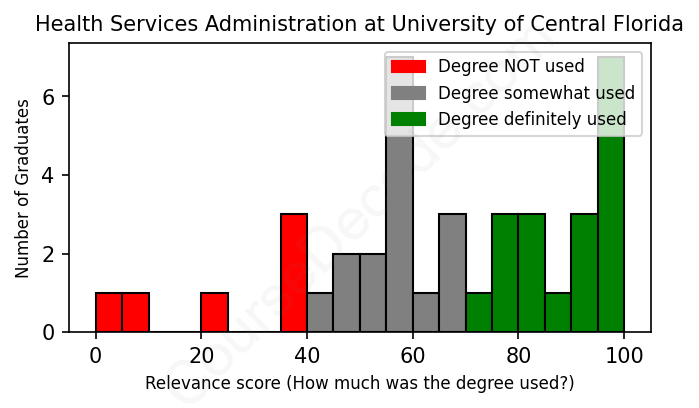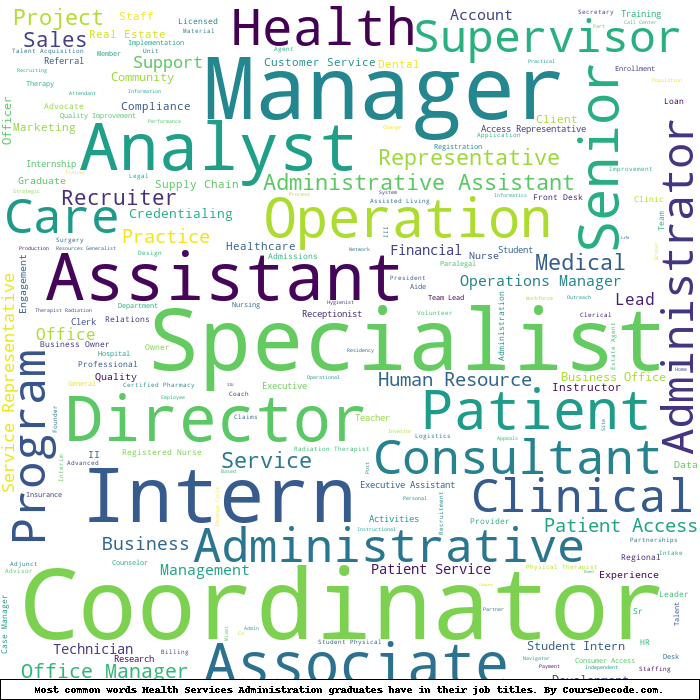
First, some facts. Of the Health Services Administration graduates from University of Central Florida we've analyzed , here's how many have used (or NOT used) their degree in their career:

These are estimates based on AI analysis of 40 LinkedIn profiles (see below).
The verdict? Slightly below average. Overall, with an average relevance score of 65%, Health Services Administration graduates from University of Central Florida have a slightly lower likelihood (-2%) of finding work in this field compared to the average graduate across all fields:
And for comparison, here's the chart for all profiles we've looked at across all degrees.
Also, after graduating, 37% of these graduates have pursued further education other than another Bachelor's degree (such as a Masters degree or other), compared to the average across all profiles of 35%. This suggests you may need more than just a Bachelors degree to be competitive as a Health Services Administration graduate.
See the details:
|
Relevance score: 41% We think this person has gone into a career only somewhat relevant to their degree. We think this person has gone into a career only somewhat relevant to their degree.
DEGREE INFOGraduated in 2011 from University of Central Florida with a Bachelor's degree in Health Services Administration. Also pursued further education since (see below). JOB HISTORY SINCE GRADUATIONResettlement Specialist Lutheran Services Florida 2012 - 2013 Transition Services Intern  Orlando Health 2013 - Aug 2013 Member of Project Transition USA Group on LinkedIn Supporting Transitioning Military & Vets  Project Transition USA Sep 2023 - Present Patient Administration Officer  US Army Nov 2012 - Aug 2014 Company X.O  US Army Sep 2014 - Aug 2015 Aide-de-Camp  US Army Sep 2015 - Nov 2016 Operations Officer  US Army 2016 - 2017 Security Manager  US Army 2017 - 2018 Operations Officer/ Security Manager  US Army 2018 - 2021 Health Care Recruiter and Officer In Charge  US Army 2021 - Present FURTHER DEGREES DONE SINCE GRADUATINGMaster's degreeUniversity of Central Florida 2011 - 2013 ABOUTNo information provided. |
The top 10 most common jobs done by the graduates we've analyzed (ranked most common to least) are:
Based on the analysis of various job profiles from graduates of Health Services Administration at the University of Central Florida, the most common types of roles they occupy include practice managers, patient advocates, administrative coordinators, and various positions within healthcare systems like AdventHealth. Many of these jobs involve oversight and management of healthcare operations, coordinating patient care, and working within healthcare regulations. Roles such as surgery coordinators, patient administration officers, and healthcare recruiters are also notable, leveraging specific skills from their degrees to navigate the complexities of the healthcare environment.
However, not all positions directly apply the knowledge gained from their Health Services Administration studies. Many graduates find themselves in roles that are somewhat related but do not fully make use of their specific training—like marketing internships or general administrative positions. In contrast, jobs like practice manager or patient relations manager demonstrate a clear alignment with the skills and knowledge from their degree. Overall, while a number of positions are directly relevant, many others are tangentially related, reflecting a mix of the applicable skills from their educational background with positions that may not fully utilize the health administration training they received.
Here is a visual representation of the most common words in job titles for Health Services Administration graduates (this is across all Health Services Administration graduates we've analyzed, not just those who went to University of Central Florida):

Graduates from the Health Services Administration program at the University of Central Florida seem to have taken a variety of career paths, most of which are fairly relevant to the field. When you look at the first jobs after graduation, a lot of them started off in roles like patient coordinators, administrative assistants, or in various support roles within health care environments. These positions provide a solid foundation for understanding the intricacies of health services and often lead to greater responsibilities as they gain experience. It's pretty common to see graduates moving into managerial and mid-level positions within healthcare organizations just a few years after graduation, which indicates a positive trajectory.
Fast forward five to ten years, and you find many of them in roles such as practice managers, patient experience managers, and even operations supervisors within hospitals or health systems. For those who are more entrepreneurial, some have ventured into owning their own businesses or pursuing specialized areas like health care recruitment or consulting. While not everyone has maintained a direct line to health services administration — for example, some have pivoted to unrelated fields after their initial roles — the general trend shows that a significant number of graduates are carving out solid careers in health care or related administrative roles. Overall, it looks like a majority of these graduates are doing well in careers that utilize their degree, signaling that the program successfully prepares students for the dynamic health services landscape.
Pursuing a Bachelor’s degree in Health Services Administration at the University of Central Florida, or really anywhere, isn’t super easy, but it’s not like climbing a mountain either. It’s pretty much on par with a lot of other bachelor programs. You’ll dive into subjects like healthcare policies, management, and finance, which can be a bit challenging if you’re not into that stuff, but if you’re organized and keep up with your studies, you can definitely handle it. A lot of students find it manageable, especially since there's a good mix of lectures, group work, and projects. Just remember, like any degree, it requires effort, but if you’re interested in the subject, it can be really rewarding!
Most commonly, in the LinkedIn profiles we've looked at, it takes people 2 years to finish a Bachelor degree in Health Services Administration.
Looking at the career paths of these Health Services Administration grads from UCF, it seems like some have hit the jackpot in terms of decent earnings, while others are still climbing the ladder. For instance, graduates who took on roles like Practice Manager or Operations Manager in healthcare typically earn pretty good salaries, potentially well into the 6-figure range as they gain experience. On the flip side, some early career jobs like being a Medical Receptionist or working as an Aide-de-Camp in the Army might not offer the most lucrative pay. Overall, those who have moved into management and specialized healthcare roles seem to be doing well, but there's a mix, and not everyone is cashing in big bucks just yet. So, it really just depends on the specific job and how far along they’ve come in their careers!
Here is a visual representation of the most common words seen in the "about" section of LinkedIn profiles who have a Bachelor degree in Health Services Administration (this is across all Health Services Administration graduates we've analyzed, not just those who went to University of Central Florida). This may or may not be useful:

Here are all colleges offering a Bachelor degree in Health Services Administration (ordered by the average relevance score of their Health Services Administration graduates, best to worst) where we have analyzed at least 10 of their graduates:
| College | Score | Count |
|---|---|---|
 Ohio University Ohio University
|
82 | 17 |
 University of Central Florida University of Central Florida
|
65 | 40 |
 Florida International University Florida International University
|
65 | 19 |
 City University of New York-Herbert H. Lehman College City University of New York-Herbert H. Lehman College
|
58 | 14 |